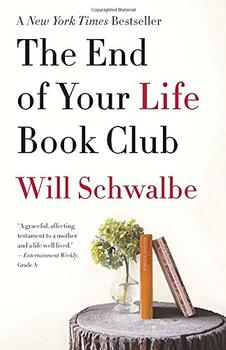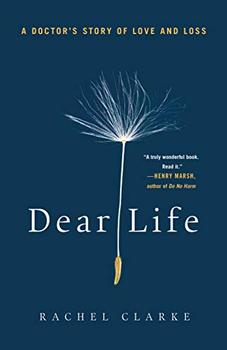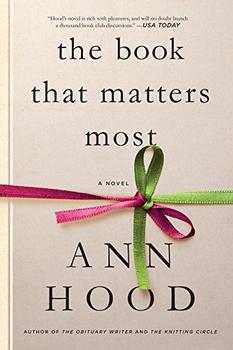Summary | Excerpt | Reading Guide | Discuss | Reviews | Beyond the book | Read-Alikes | Genres & Themes | Author Bio

When Mary Anne Schwalbe returns home from a refugee mission to the Middle East with a mysterious illness, her family thinks she will soon recover. But after months of testing, her doctors tell her she has pancreatic cancer, a disease that rarely allows its victims longer than six months to live. Her son, Will, begins to accompany her to her chemotherapy sessions. Both son and mother are reluctant to discuss the seriousness of Mary Anne's illness and what it means. Perhaps to lighten the mood, Mary Anne asks one morning: "What are you reading?" This simple question sparks the formation of a two-person book club, a monthly gathering that will help them both to process what it means to lose a loved one.
Will Schwalbe's heart-wrenching memoir is difficult to categorize. It is at once a paean to his beloved mother, a treatise on the power of reading, and a handbook on how to live - and die. With direct prose and unflinching courage in the face of sadness, Schwalbe recreates the final months of his mother's life, offering a wealth of insight into how the written word can connect lives.
Each of the chapters is organized around a book selection for the book club. Themes, characters, or situations from the book club selections are included to provide each chapter with a focal point or to prompt a response from his mother. For instance, the discussion about "Lily" in Daniyal Mueenuddin's short story collection Other Rooms, Other Wonders sparks Mary Anne to ruminate on hope. In the story, Lily and Murad's marriage begins full of hope, but as their relationship evolves, it becomes obvious that everything is against them. Applying this story to her own life, Mary Anne observes the profound sadness inherent in starting with great hope and watching that hope decline, a situation she finds herself in with her cancer diagnosis. The great dreams she has - watching her children and grandchildren grow, reading books, assisting in the construction of a library in Afghanistan - will never actualize. Just as Lily and Murad watch their hopes disappear in the collapse of their marriage, Mary Anne sees the hopes of her final years dissipate as she approaches death.
It is within these conversations - when Mary Anne extends a thought about a book to a larger, more instructive point - that the most vital theme of the book emerges. For Mary Anne's thoughts about the selections are important, but it is her larger point, the general "life advice" that the book club selections spur that most interests Schwalbe. As Schwalbe relates Mary Anne's insights, it becomes clear that this memoir is a loving repository of his mother's favorite sayings, important advice, and sentences preserving the cadence of her voice.
Schwalbe acknowledges that reading connects us to humanity and teaches us about humankind, but he suggests that it also opens pathways for individuals to connect to others. Discussing books with others creates bridges that may not have previously existed. As Mary Anne approaches death and Will is preparing to lose his mother, books allow them to discuss what is most important to them. Without these book club discussions, Schwalbe makes clear, the critical conversations they wanted to have with each other may not have happened. Books offer a public language to discuss private thoughts and a more relaxed environment to tackle the prospect of facing death.
Just as Mary Anne and Will connect through the book club, the selections help Mary Anne to reach out to others, as well. She frequently connects with friends and former colleagues under the auspices of recommending a book. Though the book club is only for Will and Mary Anne, the selections help Mary Anne knit together her wide network and keep her connected to friends and other family as she approaches death. As Schwalbe explores Mary Anne's relationship with others, relationships that are often facilitated through reading, he describes the underpinnings of his mother's life - a life filled with service, family, books, prayer, and kindness. This illustration offers us a model for how to live well and how to die with grace.
Schwalbe's memoir is dualistically tragic and uplifting. It is also very difficult to put down. His portrait of the final journey with his mother reminds us what a rare gift time with a loved one is, especially when that time is in the final days. In sharing these moments with readers, he encourages us all to value the important people in our lives and to understand how written words can sometimes provide us with the most important words of all.
To participate in BookBrowse's book club discussion of The End of Your Life Book Club, click here.
To hear a brief description of the book from Will Schwalbe, click on the video below:
![]() This review was originally published in The BookBrowse Review in October 2012, and has been updated for the
June 2013 edition.
Click here to go to this issue.
This review was originally published in The BookBrowse Review in October 2012, and has been updated for the
June 2013 edition.
Click here to go to this issue.

If you liked The End of Your Life Book Club, try these:

by Rachel Clarke
Published 2020
In Dear Life, palliative care specialist Dr. Rachel Clarke recounts her professional and personal journey to understand not the end of life, but life at its end.

by Ann Hood
Published 2017
An enthralling novel about love, loss, secrets, friendship, and the healing power of literature, by the bestselling author of The Knitting Circle.
Knowledge is of two kinds. We know a subject ourselves, or we know where we can find information on it.
Click Here to find out who said this, as well as discovering other famous literary quotes!
Your guide toexceptional books
BookBrowse seeks out and recommends the best in contemporary fiction and nonfiction—books that not only engage and entertain but also deepen our understanding of ourselves and the world around us.